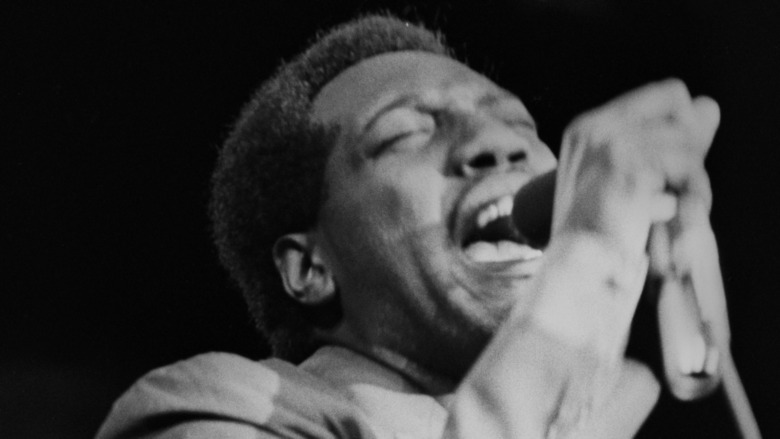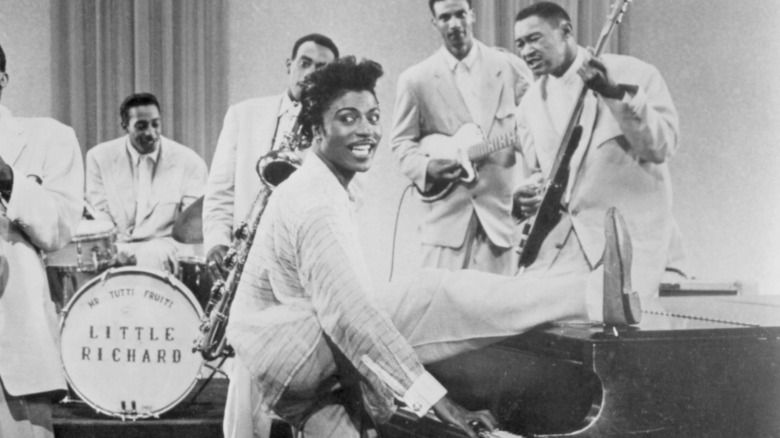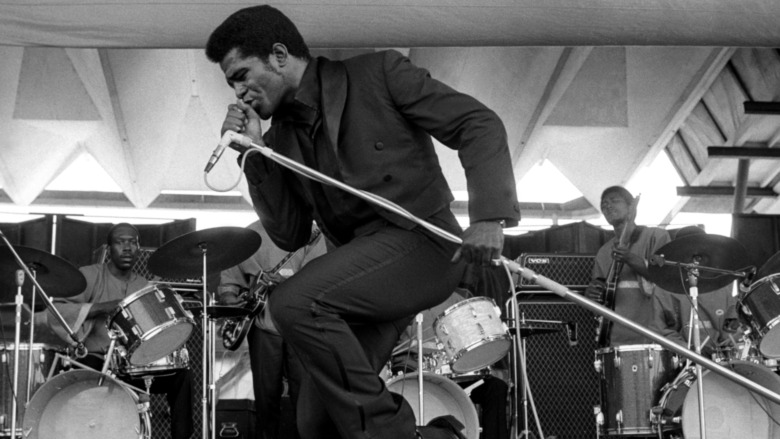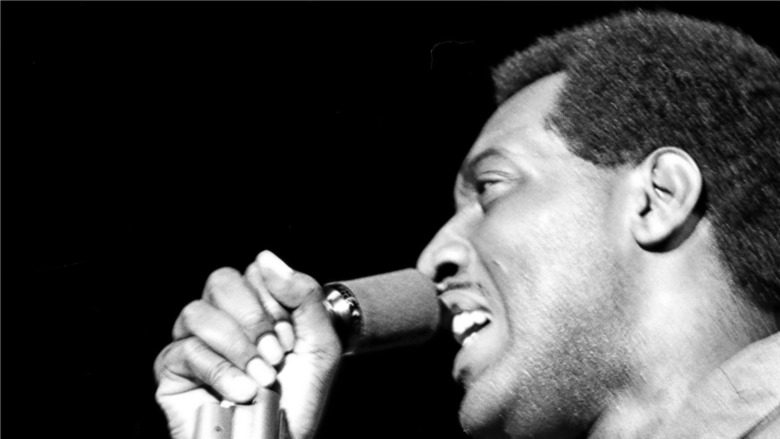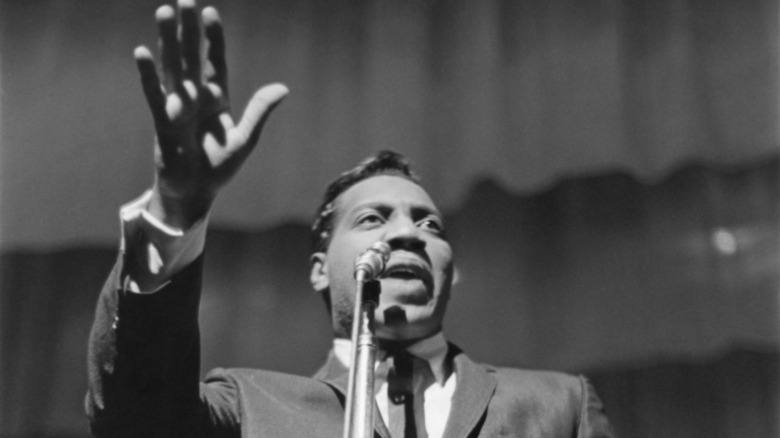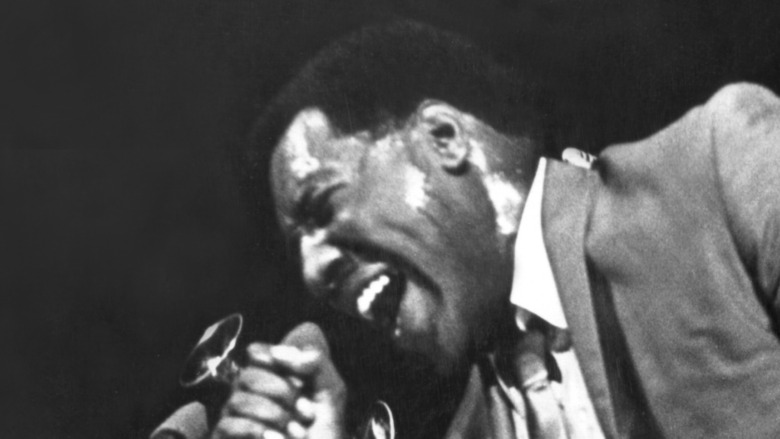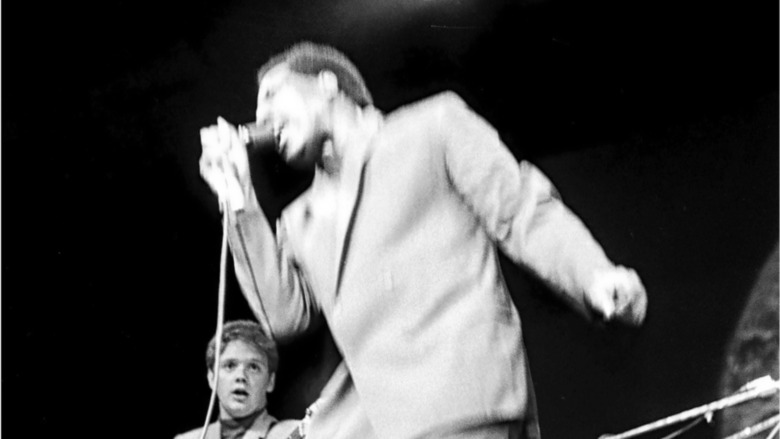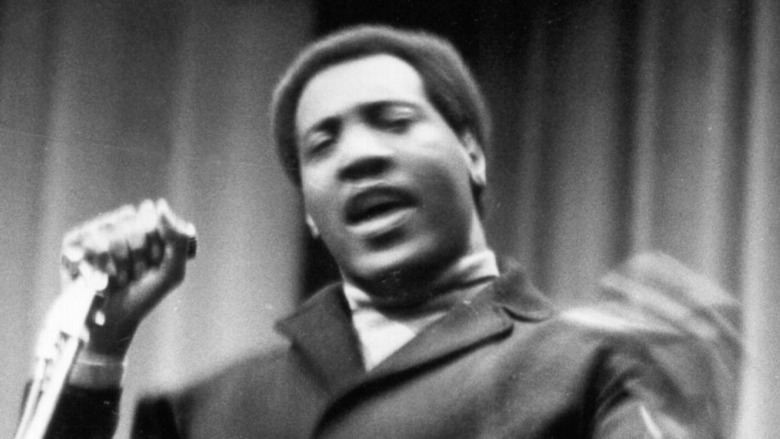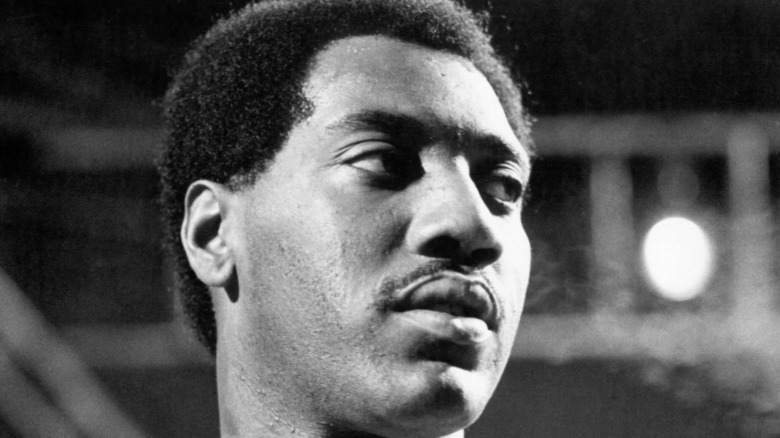The Untold Truth Of Otis Redding
Otis Redding's music career lasted less than a decade, ending in his tragic death at only 26-years-old, and he only hit the top of the charts after his death. All that being said, Redding might be one of the greatest and most influential musicians during and after his life. Despite being contemporaries with fellow soul legends like Sam Cooke, James Brown, and Aretha Franklin, Redding carved out his own mark on the musical landscape during his life.
Classic albums and electrifying live performances led Rolling Stone magazine to rank him No. 21 on their list of the "100 Greatest Artists." Steve Cropper, guitarist and member of Stax Record's legendary house band, Booker T and the MGs, said about his old musical partner, "Otis had the softness of Sam Cooke and the harshness of Little Richard, and he was his own man. He was also fabulous to be around, always 100 percent full of energy. ... After he died, I was surprised to find out I was the same age as he was, because I looked up to him as an older brother."
Unfortunately, Redding is not as celebrated worldwide as other notables, because his death came as he was about to break from a rhythm and blues star to mainstream pop star. Still, Redding remains a celebrated musician. Little Richard refers to Redding as "a pillar of rock and roll." Here is the untold truth of Otis Redding.
Otis Redding followed Little Richard
Little Richard was one of the first rock and roll stars in the genre's young history. Paul McCartney, following Richard's passing in 2020, wrote this about the departed artist to Variety. "Little Richard came screaming into my life when I was a teenager. I owe a lot of what I do to Little Richard and his style; and he knew it. He would say, 'I taught Paul everything he knows.' I had to admit he was right."
Richard had a number of disciples following at his footsteps. One of them was Otis Redding. According to Biography, Richard and Sam Cooke were two of Redding's biggest influences growing up. Redding and Richard were born and raised in Georgia. In the late 1950s, as he was beginning to launch his career, Redding joined The Upsetters, Richard's previous band.
In 1989, Richard inducted Redding into the Rock & Roll Hall of Fame. During the speech, featuring Richard singing a melody of Redding's old songs, he had this to say about Redding's cover of Richard's song, "Lucille." "I thought it was me. When I first heard that, I said, 'that's me ...' And when I saw I was his idol I just loved him being from Macon ... One of the greatest singers who ever lived. One of the greatest composers who ever lived. That's including me!"
Richard would not be the only famous Black Georgian who would have an impact on Redding's life.
Connection with James Brown
James Brown and Otis Redding are linked together in many areas. They were contemporary Black soul singers popular in the 1960s, raised in Georgia, and earned honorific titles during their careers, Brown, "The Godfather of Soul" and Redding, "The King of Soul." They are also linked together in two anecdotes that could have changed Redding's life forever.
"Mike Judge Presents: Tales From the Tour Bus" told a story of how a feud between Brown and another R&B singer, Joe Tex, ended with Brown firing guns during a Redding show. Tex and Brown believed the other musician stole dance moves, but the feud escalated when Tex's singer and girlfriend, Bea Ford, left him for Brown. Tex responded by writing the song, "You Keep Her," name-dropping Brown. Brown was so angry at Tex, that when learned that Tex was going to be at a club in Georgia, he left with his entourage and fired shotguns inside the club.
However, Tex was not at the club. Instead, Redding was performing and hid behind a piano during the shooting. No one was injured, though a few pigs behind the club were hit.
Brown would connect with Redding and make a fatal decision. According to The Badger Herald, Redding bought a plane, a twin-engine Beechcraft plane, from Brown months before his death. Brown warned Redding against using the plane, but Redding still made the purchase. That December, the plane would crash into Lake Monona, killing Redding.
Hamp Swain's "The Teenage Party"
According to Macon, "King Bee" Hamp Swain was one of the most important figures in music in the 20th century. In 1954, Swain became the first Black disc jockey in Macon, Georgia, broadcasting for WBML-AM. At the center of the burgeoning soul music scene, Swain and his own band, "The Hamptones," gave a young, inexperienced singer his first chance to sing in a band. The singer, Richard Penniman, would later don the stage name, Little Richard. Swain also was the first jockey to play James Brown's breakout song, "Please, Please, Please," on the radio. Already connected to two of Otis Redding's contemporaries, Swain also helped get Redding his first break.
As told by the official Otis Redding website, as a teenager, Redding routinely competed in talent shows at the Douglas Theatre for a $5 prize. After winning 15 straight competitions, Redding was banned from participating anymore. He then took his voice to a band, Johnny Jenkins and the Pinetoppers, at the age of 17. The band participated in Swain's talent competition called, "The Teenage Party."
Though a fantastic singer, releasing his first single, "Shout Bamalama," with the band backing him, Redding's main job with the band was as their gofer, according to The Washington Post. He drove the band to Memphis where they auditioned at Stax Records. The audition was a disaster for the band, but Redding was allowed to sing "These Arms of Mine." The song became Redding's breakthrough as an artist.
Family life
Many musicians have struggled off stage with their personal lives. Either it is estranged parents, substance abuse, or trouble with relationships of their own — musicians and unstable homes are as common as microphones and guitars. As told by The Famous People, Otis Redding did not struggle with anything such as this.
Redding was born the fourth of five children to Otis Redding Sr. and Fannie Mae Redding. Senior worked as a sharecropper and on Robins Air Force Base in Houston County, Georgia. Early in his childhood, Redding sang gospel songs for $6 a week at a local radio station. However, the small money he earned had to grow as his father suffered from tuberculosis and was hospitalized often. Redding dropped out of high school to support his family as a well-digger, gas station attendant, and singer.
At "The Teenage Party," Redding met Zelma Atwood. The pair would wed in 1961 and have four children. His daughter, Karla Redding-Andrews, spoke to GPB News, about her father. "When Dad was home, it was really an exciting time for us, because we got to experience his love of ice cream. And he loved to be on the ranch and just swimming in this huge swimming pool that we had. And, you know, farming with the animals."
His widow, Zelma, is the president and founder of the Otis Redding Foundation. The Independent Mail reports that Zelma also managed acts such as Percy Sledge and Clarence Carter and ran a record shop and club.
Otis Redding at the Apollo
The Apollo Theater in Harlem remains the Mecca for Black performers. The sanctuary holds the line, "Where stars are born and legends are made." According to Soul Music, Otis Redding arrived in New York in 1963, not only to perform live on the hallowed grounds but also to record his first album, "Pain in My Heart." The title could accurately describe Redding's time in New York.
Redding was incredibly nervous leading up to the performance. Though an experienced singer in the South, Redding was less than a year out from his first singles, and now he was performing at the Apollo, says Stax Records. Redding's nerves became the least of the problems. Financially strapped, the band stayed at the "big old raggedy" Hotel Theresa. Also, while Redding and his band were making $400 per week, the sheet music the band used cost $450 a week. Ben E. King, the headliners, gave Redding $100 to help.
King remembered how nervous Redding was before his performance. "Otis told me he was up from home and he was terrified ... [he] said to me, 'You think that they're gonna go for what I do, what we do down home?'"
Still, as Redding stepped on the stage and belted out his soulful songs and emotional ballads, the crowd at the Apollo erupted in applause for the singer. On the 50th anniversary of his last single, "Sittin' on the Dock of the Bay," the Apollo honored Redding with a tribute concert, Billboard reports.
Commercial breakthrough
Early in his career, Otis Redding fell under the same dilemma that every African-American artist faced — attempting to break through commercially in the racist pop music industry. According to Black Past, Redding performed at white fraternities in the South while touring the "Chitlin' Circuit." The circuit was a series of nightclubs where the best Black performers were able to play for Black audiences.
While Motown artists up in Detroit saw success on the pop charts in the early and mid-1960s, Redding's and other southern artists had trouble crossing over. According to Billboard, only a handful of Redding's singles were able to make it to the top 40, and none were able to hit the top 20 during his lifetime. The closest he came at a top 20 hit was the single, "I've Been Loving You Too Long (To Stop Now)," which peaked at No. 21 in July of 1965.
By 1964, another challenger entered the ring. The Beatles made their debut in February of 1964, bringing with them their own hit songs, as well as a bridge to a number of new artists from east of the Atlantic. Redding, like other American artists, attempted to gain success through covers. In April 1966, his version of The Rolling Stones hit, "Satisfaction," peaked at No. 31 on the charts. He also covered The Beatles' hit, "Day Tripper," which peaked at No. 43 in March of 1967, as told by Official Charts. That all changed in the summer of 1967.
Monterey Pop Festival
While successful on the soul charts, Otis Redding's magnum opus during his life had to be his performance at 1967's Monterey Pop Festival. As the first of the big rock festivals, Monterey had been a coming-out party for artists such as Jimi Hendrix, Janis Joplin, The Who, and Redding. Bob Weir of The Grateful Dead, who also performed at Monterey, said this upon watching Redding, "I was pretty sure that I'd seen God onstage."
Consequence reports that most of the Stax Records lineup, including Redding, were touring Europe when the festival was announced. Redding's manager, Phil Walden, wanted to expand his star to a white audience, and after getting reassurance from The Rolling Stone's manager, Andrew Oldham, and Atlantic Records producer Jerry Wexler that the festival was legit, Redding was signed up to close Saturday night.
Monterey Pop was meant to show rock music and all its influences and variations as a "legitimate art form." Similar to his Apollo performance, Redding was very nervous, his wife recalled. Still, with an introduction from Tommy Smothers of the Smothers Brothers and about half an hour, Redding closed Saturday with historical performance.
According to CBC, by the end of the performance, a reviewer said, "he had the audience spinning like a chicken on a spit." Rainfall led authorities to push for the concert to end but not before Redding belted out two final covers, "Satisfaction" and "Try a Little Tenderness," before leaving the stage to an audience dazed. Redding was finally a superstar.
The plane crash
The last six months of Otis Redding's life saw him experience some of the highest peaks of his career, as History reports. His performance at Monterey had now made him a crossover superstar, and he was continuing to tour and work in the studio with big plans for 1968.
According to Commercial Appeal, Redding and his backing band, The Bar-Kays, were ending 1967 with a series of university tours. The backing group had been with Redding since the summer and was made up of teenagers, no older than 19, as stated by Madison. After a 10-night stand at the Apollo, Redding took a small break to rest his voice and work on a new song. He returned in early December for a three-show stand, starting at Vanderbilt University. The next night, Redding performed on the show, "Upbeat," and performed another concert.
The band would take their private plane to their last show in Wisconsin. Ben Cauley of the Bar-Kays remembered 50 years later that afternoon. He recalled one of his bandmates asking to turn up the heat but being told the battery was too low on the plane. Around 3:30 p.m., Cauley woke up to the plane shaking violently. Upon looking at his bandmate, Phalon Jones, screaming, "Oh No!" as he stared out the window, Cauley unbuckled his seatbelt. The plane crashed into Lake Monona in Madison, Wisconsin. Cauley was the only survivor on the plane, as he clung to a cushion while in the frigid water.
Sittin' on the Dock of the Bay
That last song that Otis Redding worked on before going back on tour was "Sittin' on the Dock of the Bay." The song was unlike any other song from Redding's discography. It played more like something heard from Bob Dylan and not the man who just rocked Monterey and was called, "The King of Soul." The origins of the song can be found following a favor from concert promoter Bill Graham.
In August, following a show, Graham had allowed Redding to stay on his houseboat, reports Rock History Music Lessons. On the boat, he wrote the lyrics to the song. While he had the words done, vocal surgery forced Redding away from the mic for a while. That November, Redding called Steve Cropper of Booker T & The MGs saying, "I got a hit" and to meet him in the Memphis studio. The pair wrote the rest of the lyrics and arrangement.
Redding closes out the song with a whistled outro. Cropper said he left the space for the duo to add lyrics if necessary, as Redding forgot the lyrics he wanted to close out on. Redding never heard the final version of the song, as he died shortly after the initial recording, and Cropper continued to work on the song. Cropper released the song at the insistence of Atlantic Records. In March 1968, the song hit No. 1, making Redding the first artist with a posthumously No. 1 song and his first top 10 single of his career.
Stax Records after Redding's death
Losing a superstar on the level of Otis Redding would be devastating for any record label. However, Redding's death was more than that for Stax Records. Redding was the record label's top performer, money maker, and face. Already in financial struggles, Redding was almost single-handedly holding Stax on his shoulders. Amazingly enough, according to the Memphis Music Hall of Fame, Redding entered Stax studio as a roadie before becoming their breadwinner. By his final year, he was considered the top male vocalist by Melody Maker, overtaking Elvis Presley who held the spot for a decade.
According to the Stax Records' official page, after his death, Atlantic Records held distribution rights for Redding's songs, leaving the Memphis record company in dire straits. The company was forced to forfeit the rights to music recorded in their studio. Black Past says if not for the leadership of songwriter, producer, and executive Al Bell, the company would have died when Redding passed. Instead, the company began to focus outside the pop charts, recording gospel albums with The Staple Singers and comedy albums from Richard Pryor.
Unfortunately, by the middle of the 1970s, the company could not survive any longer. The famed record company was forced to declare bankruptcy. Fortunately, Fantasy Inc. purchased the company's masters and revived Stax and its sister companies. In terms of success and influence, Stax today is seen as second only to Motown in terms of spreading African-American music to the masses.
Famous covers
Otis Redding both performed a number of covers that he made his own and has had his songs being covered by other artists. And it goes without saying that one cover stands out above the rest. According to Biography, in 1965, Redding wrote and released "Respect," which did peak at No. 4 on the charts. Two years later, Aretha Franklin took the song and made it her signature song, with the song reaching No. 1. From a woman's perspective, the song that originally came from a man's point-of-view now became an anthem for the rising feminist movement in the United States.
During his career, Redding covered artists that inspired him in his youth, such as Little Richard's "Lucille" and Sam Cooke's "Chain Gang." He also put his touch on the British Invasion musical acts and his African-American contemporaries, such as James Brown, Eddie Floyd, and Marvin Gaye, according to Second-Hand Songs. The website also states that artists from Sammy Hagar to Sara Bareilles have put their own spin on "Sittin' on the Dock of the Bay."
In 2011, as told by Billboard, Redding scored a second top 20 hit when Jay Z and Kanye West sampled his version of "Try a Little Tenderness" for their hit song, aptly titled "Otis." Even more than four decades after his death, Redding's beautiful voice and soulful wailing still resonate with an audience who had to look up the otherworldly voice over the two rap superstars.
